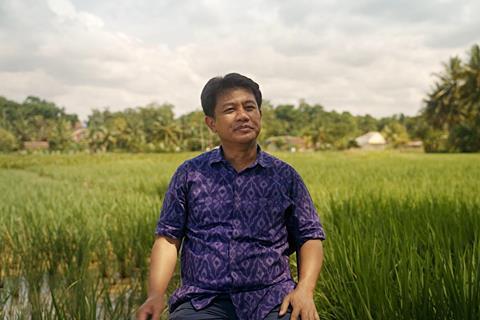An examination of Dutch attempts to reframe the Indonesian War Of Independence

Dir: In-Soo Radstake. Netherlands. 2023. 132mins
Between 1945 and 1949, the Indonesian War Of Independence between the newly-declared independent Republic of Indonesia and the Netherlands — which wanted to regain the Dutch East Indies as a lucrative colony following the Japanese wartime occupation— resulted in thousands of casualties, mass displacement of people and serious international diplomatic incidents. Yet the Dutch authorities have long attempted to relegate the war to a footnote of history; literally, according to one of the interviewees in this eye-opening documentary, who recalls it being barely mentioned in her school textbook. Now, director In-Soo Radstake employs the help of global historians and academics to present a fascinating deep-dive into the war, and exactly how — and why — the Dutch government attempted to package its intervention as a humanitarian mission.
A lightness of touch that rewards a curious audience
Born in South Korea but raised in Holland by adoptive parents, Radstake is well-placed to explore this piece of history. Cultural duality is something he has explored in previous documentaries like his biographical Made In Korea (2006), which debuted at Busan, and Parradox (2010), a portrait of Surinamese-Dutch filmmaker Pim de la Parra, which premiered at IDFA. Selling A Colonial War, which also debuts at IDFA, is undoubtedly a sprawling concept, and a two-hour-plus historical documentary may well be a marketing challenge. But, working closely with editor Rene Hazecamp, Radstake keeps a tight reign on the subject and brings a lightness of touch that rewards a curious audience.
There are, it transpires, myriad reasons as to why the Dutch wanted to downplay the conflict but, despite the wealth of information being discussed, the film unravels the threads in a chronological, easy-to-follow manner. A variety of talking heads with experts from Indonesia (including historian Bonnie Triyana), the Netherlands (Ben Bot, the former Dutch Minister Of Foreign Affairs), Australia and the UK explain just how, on August 17 1945, after decades of a growing independence movement that had intensified during Japan’s occupation of the territory during the Second World War, nationalist leaders Sukarno and Mohammed Hatta declared Indonesia an independent republic. The message was spread through graffiti, domestic media and the actions of the ’pemuda’, the country’s politicised youth movement.
What followed is complicated, but compelling. Initially, with the Dutch weakened after the Second World War, Allied forces were deployed to help restore order with the British using the services of Nepal’s Gurkhas. Conflict was brutal and the casualties mounted on both sides. In 1946, the Dutch government sent thousands of its troops to Indonesia, badging the campaigns ‘police actions’ to make them more palatable and deploying racist rhetoric to suggest they knew what was best for native Indonesians. Throughout, the Netherlands’ Military Information Service carefully managed all images and film, making sure Dutch people saw a sanitised version of events; it was only when the international community, under the newly-formed UN Security Council, put political and economic pressure on the country that it finally capitulated.
There is a lot going on here, but Radstake makes it easy to follow with on-screen information about key dates and events, and regular reminders of the interviewees and their specialities. He also keeps it visually interesting; not just in the regular use of illustrative (and often difficult) archive footage – some of it only recently discovered – but also by conducting his interviews in different settings; a vast library, or an Indonesian field. Crucially, too, he keeps things light and brisk; buoyed by Nando Eweg’s score, he moves the action fairly quickly between each talking head and retains candid, often humerous moments such as experts having to refer back to books, the subject being too unwieldy even for them. Crucially, it is also well-balanced, with Radstake careful to include multiple perspectives — including Indonesian violence against Indo-Europeans and even its own people.
The film also makes the point, through various images of recent uprisings and toppled statues the world over, that issues of colonisation, race and power are not consigned to the past; they remain very hot topics of debate. “Being able to narrate history is a great power,” says one interviewee early on; with Selling A Colonial War, Radstake shows just how important it is to carefully examine all sides of the story.
Production companies: Holland Harbour
Producer: Nadadja Kemper, Rob Vermeulen
International sales: Rise And Shine World Sales info@riseandshine-berlin.de
Cinematography: Robijn Voshol, Thiemo van Dam, Lawrence Lee Kalkman
Editing: In-Soo Radstake, René Hazekamp
Music: Nando Eweg






![The Brightest SunScreen[Courtesy HKIFF]](https://d1nslcd7m2225b.cloudfront.net/Pictures/274x183/3/5/0/1448350_thebrightestsunscreencourtesyhkiff_312678.jpg)















![The Brightest SunScreen[Courtesy HKIFF]](https://d1nslcd7m2225b.cloudfront.net/Pictures/100x67/3/5/0/1448350_thebrightestsunscreencourtesyhkiff_312678.jpg)

